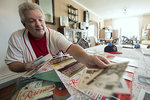
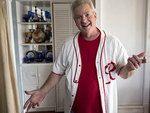
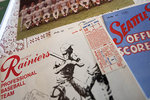
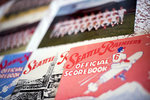
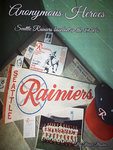
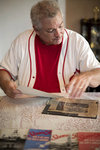
Bruce Baskin was just a kid when he fell in love with the Seattle Rainiers.
He was a teenager when he decided to start writing a book about them.
Today, he still gets a little misty-eyed talking about the team that defined his childhood and what a privilege he considers it to be the one to write their history.
“I thought, ‘This is Seattle’s last minor league team, it’s the last team to play at Sick’s Stadium,’” Baskin said. “You can’t ignore a history like that. I figured if I didn’t do it, nobody’s going to.”
Baskin, of Chehalis, recently published “Anonymous Heroes: Seattle Rainiers Baseball in the 1970s,” bringing to fruition a 40-year project to chronicle the history of the minor league team that played in Seattle between the Pilots and the Mariners.
A Lewis County resident since 1993, many people know Baskin from his sports and news announcing for KELA and KITI. He has also done local sports announcing in a number of venues. And while he may be known for his far-reaching love of all things sports, it was not a passion that he was born into, he admitted. It wasn’t until about third grade that he really began to follow local sports teams such as the Sonics basketball team and Totems hockey team. He still really disliked baseball.
“It preempted my cartoons,” he said with a laugh.
But that was before a magical trip to Sick’s Stadium in 1969 with his grandfather, who had been a groundskeeper at the field for many years. It was at that game between the Seattle Pilots and the Baltimore Orioles where Baskin’s attitude changed.
“I just became a baseball fanatic,” he recalled.
His timing for becoming a baseball fan could not have been worse.
The Seattle Pilots played just one season in Seattle before the team was sold to Milwaukee in 1970. A year later, Baskin’s grandfather died. But still in his heart, Baskin remembered that trip to Sick’s Stadium and the inspiration it sparked in him. That led him to connect with the Seattle Rainiers, a minor league team that played 1972-1976.
Baskin, raised in Bellevue, was 13 when the Rainiers began playing. He said from the moment they began he followed them as closely as possible, even a few times taking buses into the city to attend games. For Baskin, the Rainiers represented a chance to continue following baseball and to cheer for local players.
Unfortunately for the Rainiers, Baskin was among the minority. The Rainiers only averaged about 1,000 attendees per game their first season and by the fifth and final season were averaging more like 500 spectators a game. Baskin noted that this was before minor league baseball became popular through avenues such as the major motion picture “Bull Durham.” At that time, you could buy a team for under $5,000, whereas franchises in the same league can be worth more than $8 million today.
“We were the few, the proud, the disillusioned,” he said of the Rainiers fans. “I didn’t care. I didn’t care because they were my team.”
Baskin also noted that many in Seattle did not support the Rainiers because there was a great deal of infighting and bitterness toward baseball in the city at the time. The Pilots were the first-ever major league baseball team to go bankrupt and there was much acrimony among city leadership about how that happened. Baskin said he believed many were simply waiting for the Kingdome to be sited and for a new major league team to come to town.
“They’d already seen major league baseball,” Baskin said. “I think the attitude was, ‘Why would we pay $2 to see someone we don’t know.’”
The Seattle Mariners began playing in Seattle in 1977.
Baskin’s book project began simply as an effort to create a master roster of every Rainier player with stats. In 1994 he published a short version of what it would become that he gave to any of the players who he could track down. He noted that in the early days of his research, there was no internet so research was slow and laborious.
“It was a lot of hours spent at the Seattle Public Library looking up scores,” Baskin said.
But the 1994 version was not as complete as he wanted it to be. He said the internet really gave him a new chance to create the book he had really wanted by giving him greater access to other databases without having to travel to them. He said he was able to track down many of the players who he had previously been unable to find. But one of his proudest moments in the newest iteration of the book was finding former owner Art Peterson’s wife living in Sacramento. He said he had found almost every former player but the owners had been a lot more elusive to find. Peterson died in 2010 but Baskin was able to travel to see Peterson’s widow and sons to present them with a copy of the book.
“They were really excited this came out and I think she was really touched,” Baskin said.
Baskin self-published “Anonymous Heroes” and is offering copies for sale through Book ‘n’ Brush in Chehalis as well as e-mail. But he said while he’d like the book to sell well, that was not his reason for creating it. All former players get a copy because he said “they already paid for it” by playing. He also sent copies free of charge to the Baseball Hall of Fame and other baseball museums that may have an interest in keeping them for records. Sharing a piece of history and honoring a team that meant so much to him is his greatest reward, he said.
“If I break even financially with this I’m fine but even if I lose money at least I get that out there,” Baskin said. “I just felt like this was a team that deserved a little recognition.”